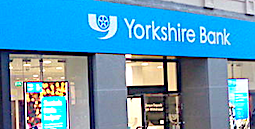Shares of Clydesdale and Yorkshire Bank owner CYBG fell more than 5% after it said it expects to increase its provisions for legacy PPI costs as at March 31, 2018, by about £350 million.
“Under the terms of the conduct indemnity deed with National Australia Bank the remaining undrawn indemnity amount of £148 million will be fully utilised, with the balance funded by CYBG,” said the bank in a stock exchange statement.
“CYBG therefore expects to recognise a charge of £202 million (pre-tax) in its income statement for the six month period ended 31 March 2018.
“This would result in a pro forma reduction in the Group’s Common Equity Tier 1 (CET1) ratio of approximately 100 basis points as at 31 December 2017.
“The group has been operating two PPI programmes concurrently over the past six months, comprising the proactive customer contact remediation exercise and customer-initiated new complaints handling.
“The group has now completed the review of all cases within the scope of the remediation programme.
“The review of the final cases was more complicated and time-consuming than previously anticipated and, as a result, the group has increased the provision required to close-out the programme.
“Within the customer-initiated complaint programme, CYBG, in line with the rest of the industry, has experienced a sustained period of elevated complaints in the six months to 31 March 2018 with the peak occurring in January.
“The group has received approximately 59,000 complaints during this period and this is higher than forecast.
“The elevated level of complaints has been driven by a combination of factors including heightened media coverage, the FCA advertising campaign and increased activity by claims management companies.
“In determining the level of additional provision required, the group has conducted a detailed review of its recent experience and undertaken a robust scenario analysis to reassess its view of the outlook for complaint volumes.
“The group now expects the current level of complaints to remain at an elevated level for a period of time, followed by a reduction in volumes and costs as we approach the time bar in August 2019 …
“While the impact on the group’s CET1 ratio of approximately 100 basis points means it will be operating below its guidance range of 12-13%, the group continues to maintain a significant buffer to its regulatory capital requirement.
“The group remains confident in the business delivering net capital generation going forward and is on track to deliver its medium-term targets.
“The group continues to progress its IRB application with the PRA and is confident of achieving accreditation for its mortgage portfolio within the next six months.
“Following this the group would work with the PRA to determine its IRB regulatory capital requirement.
“As previously guided, the adoption of IRB models is expected to result in a material reduction in the group’s credit RWAs and a consequential significant increase in the Group’s CET1 ratio.”
The bank will provide a detailed financial update at its interim results on May 15, 2018.
